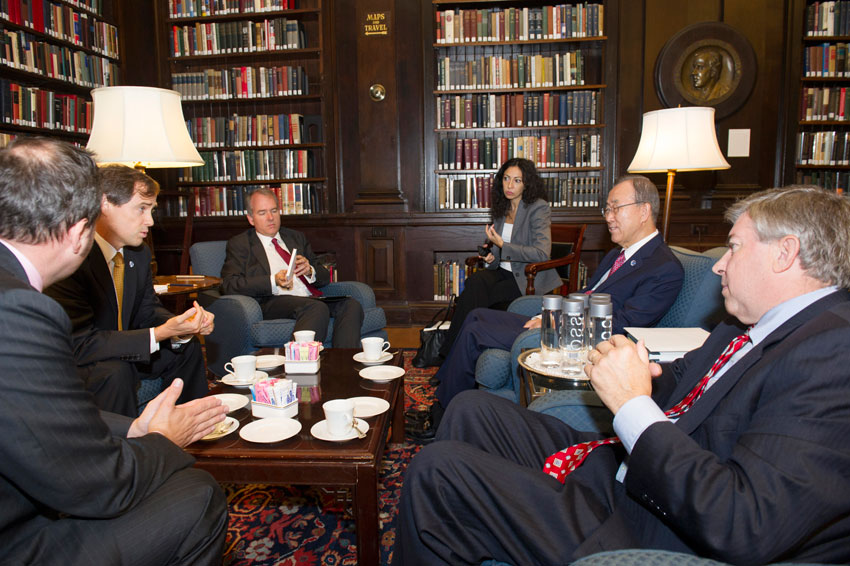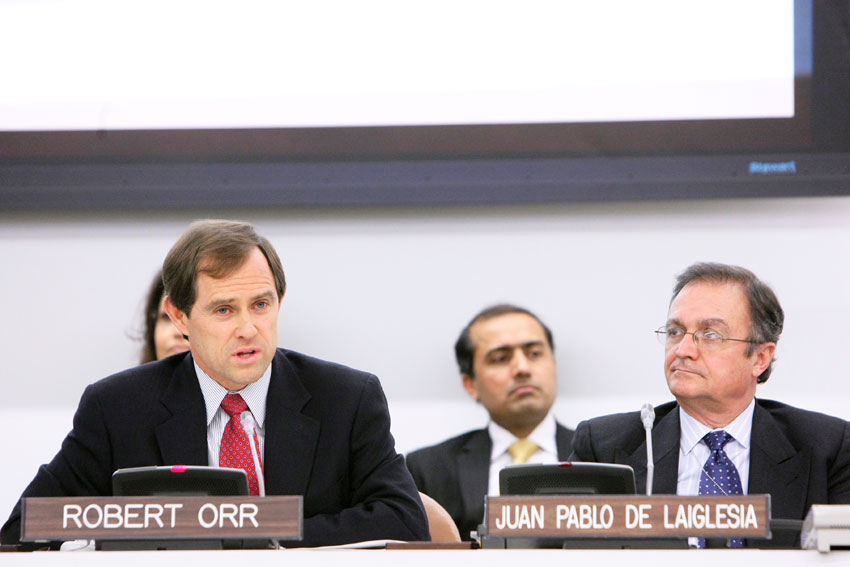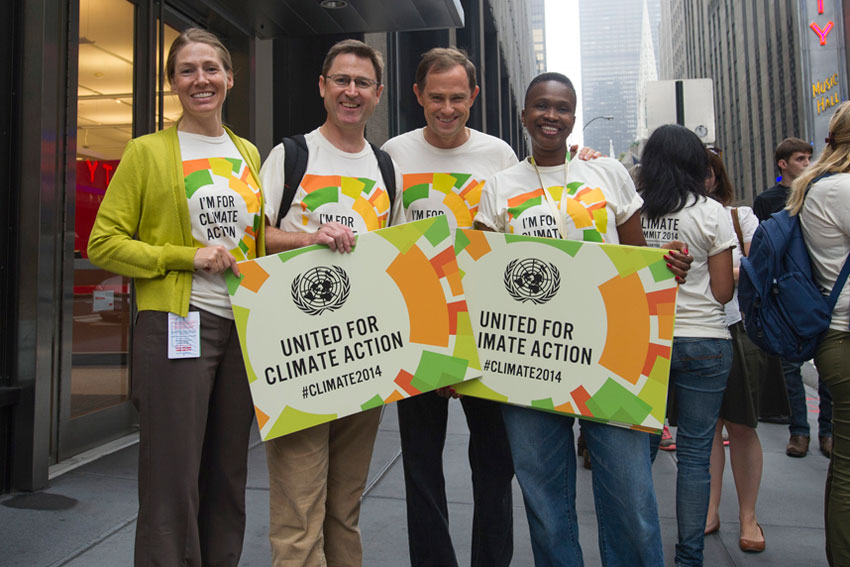INTERVIEW: UN can be ‘platform for solutions’ for global challenges, says outgoing policy official
Speaking with the UN News Centre on the eve of his return to academia, Mr. Orr reflects on his 10 years with the world body, including some of the important initiatives he was involved with, what has surprised him the most, what will stay with him long after he leaves, and what makes the UN “a very special place.”
UN News Centre: What motivated you to work at the United Nations?
Robert Orr: The United Nations is unique. It’s the home of the peoples of the world. When I was invited to come by Secretary-General Kofi Annan, it’s an invitation you can’t say no to… come to try to help solve the big problems of the world… I was just crazy enough and just ambitious enough to want to do exactly that.
UN News Centre: What was your first impression of the Organization when you began working here?
Robert Orr: The United Nations in 2004 was an Organization under siege. The United States had issues with the Organization relating to the war in Iraq. There were great divisions in the Security Council around the war in Iraq. The ‘oil-for-food’ programme and all of the controversies around that had a sense of a siege mentality inside building.
So when I came, I remember thinking how much good the Organization could be doing but that it was spending all of its time defending itself. And the fact that multilateralism and the United Nations was on trial seemed exactly backwards to me. So [I was] coming in with a bit of a fresh view and a fresh wind to try to defend not just multilateralism but the good that this Organization can do.
UN News Centre: And how do you view the Organization now?
Robert Orr: The UN in 2014 is a very different place than it was in 2004. Partly, I think the UN has grown into dealing with global issues in a way that has far surpassed the reach of the Organization in 2004 – from climate change to catalysing progress on the full range of the Millennium Development Goals. The UN has reached into parts of the world on issues and with communities and constituencies that we just didn’t have a decade ago when I came here.

Secretary-General Ban Ki-moon (centre right) confers with Robert Orr (centre left) and other senior members of his staff before attending the second annual meeting of the International Development Finance Club in Washington, D.C. in October 2013. UN Photo/Eskinder Debebe
UN News Centre: Is there an experience or a person you met or a place you visited as part of your work that will stay with you forever?
Robert Orr: Quite a few actually... while I can think of many people in many places, maybe the most searing memory is when the Secretary-General [Ban Ki-moon] visited the island nation of Kiribati in the Pacific. We were doing a town hall meeting in a village that was flooded regularly, virtually every night, and where the villagers really had nowhere to go. And the issue that we were going to Kiribati to address is the issue of climate change. In a town hall meeting, a young girl raised her hand and asked the Secretary-General ‘Sir, what will become of us?’ It was so profound and so direct. She did not have the answer, nor did the elders in her village have the answer. And she was turning to the Secretary-General and to the United Nations, not just to answer the question but to actually address the issue.
That sense of responsibility sat very heavily with the Secretary-General and I will say with me, personally. It’s quite a motivator when you see the people affected by a problem that really only the United Nations can solve. It puts quite a burden on your shoulders.
UN News Centre: You served as an adviser on a range of issues. Is there any particular issue on which the UN produced outcomes that surprised you?
Robert Orr: Absolutely, terrorism and counter-terrorism. When I started working on terrorism and trying to find a way that the UN could get a consensus on an approach to addressing terrorism, I was told in no uncertain terms by many Governments ‘don’t even try… we’re not going to agree on this issue… we have agreed to disagree.’ But I disagreed with their agreement to disagree. We surveyed what Governments could agree on [regarding] terrorism and from that, we built up a global strategy on counter-terrorism.

Robert Orr (left) speaks at the launch of a new publication of the UN Office on Drugs and Crime, "Criminal Justice Response to Support Victims of Acts of Terrorism," in November 2011. UN Photo/JC McIlwaine
What surprised me was that at the end of the day, we not just had a good debate, which I thought we could generate, but there was actual agreement on a global counter-terrorism strategy that included all, at that time, 192 governments – a consensus resolution that was very substantive and very real.
And the fact that now there is a Counter-terrorism Centre at the UN, with over $150 million of voluntary funding, to address counter-terrorism needs on the ground that stretch from addressing the conditions conducive to terrorism all the way to protecting human rights in the fight against terrorism…And the world’s governments all agreed to do this together on one of the most sensitive and conflictive issues up until that time. I think it just shows that sometimes the UN has to be bold. If you identify the right problem and you work hard enough and build the coalitions, things are possible that in the beginning a lot of people say are impossible.
UN News Centre: UN reform has been such a big issue during your time here. What would you say have been the most important changes that have taken place?
Robert Orr: The parts of UN reform that I feel most strongly about and the ones that I was most directly involved in are those relating to big architectural changes because there are many kinds of reform that make the Organization work better, work more efficiently. In 2004, the basis of intergovernmental human rights in the UN was extremely damaged; it was weak; there was no consensus. The Human Rights Commission had really fallen into disrepair. The proposal that the Secretary-General put to the Member States – to de-commission the Human Rights Commission, which was really considered very radical at the time, and to create in its place a Human Rights Council that would have different membership, different rules of the road – managed to rebuild the consensus that human rights are a concern for all governments in the world…

Secretary-General Ban Ki-moon (right) consults with senior adviser Robert Orr during the Group of 20 (G20) Summit in Cannes, France, in November 2011. UN Photo/Evan Schneider
The fact that we were also able to, in the 2005 Summit, get governments to agree to double the budget of the Human Rights Commissioner to support this big new vision – that there would be universal peer review of all governments of each other – it showed that a big move was possible and again, it was an area in human rights that was considered so conflictual, it was the proverbial third rail that you weren’t supposed to touch. Today there is a vibrant, real human rights debate, not only in the Human Rights Council, but now the [High] Commissioner for Human Rights and the whole human rights system, with the [Human] Rights Up Front approach of the Secretary-General… We’re seeing human rights back in the forefront across the width and the breadth of the UN’s work. That’s a big deal.
The one other area I’d note is an area that the UN has done a lot of work in trying to nurture countries back to health after a conflict. But the peacebuilding architecture that was built in the wake of the 2005 Summit is a reform that is still in process, but I think is quite significant. That we have to work with countries not just years but decades after they’ve been through a major conflict. We have gotten better at helping countries get out of the intensive care unit, but then you need some palliative care and some long-term care.
And the fact that now we have countries that are major contributors, putting people and money and experience to bear on other countries’ problems, when they just a few short years ago were the ones that were in the intensive care unit, that’s incredibly gratifying and it’s a UN reform story that I don’t think people think of as reform. But by building that new architecture, the UN is now able to help fill a space that was previously quite empty.
UN News Centre: You’ve played a major role in the Secretary-General’s efforts on climate change. How best can the UN contribute to addressing this challenge?
Robert Orr: The Secretary-General’s climate change summit just last week was truly historic. And it was not just historic because it had the largest gathering of world leaders and the largest gathering of international capital and of CEOs of major corporations from around the world. It was historic because of the nature of the interaction and the commitments between the governmental leaders, the finance leaders, the civil society leaders and the corporate leaders. The fact that the UN can be a platform for solutions on the ground, not just a place that passes resolutions and negotiates treaties, but actually builds the community of practice that can actually solve the problem.

Robert Orr (second from right) joins fellow UN staff at the People's Climate March held in New York City in September 2014 which drew some 310,000 people. UN Photo/Mark Garten
And a problem the size of climate change is not easy to solve. So the fact that not only everyone came together here at the UN, but that they agreed to move significant amounts of their capital from ‘dirty investments’ to clean investments – over $200 billion pledged to move in the next 14 months. The idea that the UN can actually move markets – real-world financial markets, real-world investment markets – shows that there’s a power in this Organization in bringing everyone together that we’ve long undervalued and underutilized. But now the Secretary-General has seen very clearly that that is possible and the fact that climate change will only be able to be addressed bringing all these players to bear, that’s an exciting new frontier for the UN.
UN News Centre: What will you miss most about working for the United Nations?
Robert Orr: The people. The UN is a great Organization with a great purpose. But it would really, truly just be a building or a series of buildings if it weren’t that it attracts not only the best and brightest from around the world but the most committed, the most passionate. And the people that quite frankly could do a lot of other things… they could make a lot of money… they could run their own governments. But they choose to be here at the United Nations. They choose to work in the house of the world’s peoples, not just in their own country or in their own interests. It makes it a very special place, that community, even family. There is such a thing as a UN family, and it suffers together sometimes, it celebrates together. But certainly, I will miss the incredible family of the United Nations.

